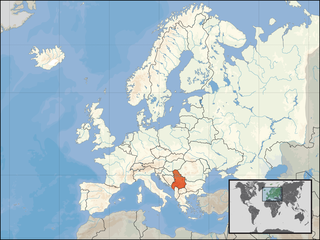| UN Security Council Resolution 821 | |
|---|---|
Flag of the Federal Republic of Yugoslavia (Serbia and Montenegro) | |
| Date | 28 April 1993 |
| Meeting no. | 3,204 |
| Code | S/RES/821 (Document) |
| Subject | Federal Republic of Yugoslavia |
Voting summary | 13 voted for None voted against 2 abstained |
| Result | Adopted |
| Security Council composition | |
Permanent members | |
Non-permanent members | |
United Nations Security Council resolution 821, adopted on 28 April 1993, after reaffirming Resolution 713 (1991) and all subsequent resolutions, the Council also recalled resolutions 757 (1992), 777 (1992) and General Assembly Resolution 47/1 (1992) which stated that the state formerly known as the Socialist Federal Republic of Yugoslavia had declared to exist and that it should apply for membership in the United Nations and until then should not participate in the General Assembly.

United Nations Security Council resolution 713, adopted unanimously on 25 September 1991, after receiving representations from a number of Member States and commending the efforts of the European Community in the region, the Council decided to impose, under Chapter VII, an arms embargo on the Socialist Federal Republic of Yugoslavia, in light of the outbreak of fighting in the country. Resolution 713 was the first resolution that concerned the breakup of Yugoslavia.

United Nations Security Council resolution 757 was adopted on 30 May 1992. After reaffirming resolutions 713 (1991), 721 (1991), 724 (1991), 727 (1992), 740 (1992) 743 (1992), 749 (1992) and 752 (1992), the Council condemned the failure of the authorities in the Federal Republic of Yugoslavia to implement Resolution 752.

United Nations Security Council resolution 777, adopted unanimously on 19 September 1992, after reaffirming Resolution 713 (1992) and all subsequent resolutions on the topic, the Council considered that, as the state known as the Socialist Federal Republic of Yugoslavia (SFRY) ceased to exist, it noted that under Resolution 757 (1992), the claim by the Federal Republic of Yugoslavia to continue automatic membership in the United Nations was not widely accepted and so determined that membership of the SFRY in the United Nations cannot continue. Therefore, the Council recommended to the General Assembly that the Federal Republic of Yugoslavia cease participation in the General Assembly and apply for membership in the United Nations.
Contents
Resolution 821 stated that the Federal Republic of Yugoslavia (Serbia and Montenegro) cannot automatically continue the membership of the former Socialist Federal Republic of Yugoslavia in the United Nations, and therefore recommends to the General Assembly that it decide that the Federal Republic of Yugoslavia (Serbia and Montenegro) shall not participate in the work of the United Nations Economic and Social Council, deciding to consider the matter again before the end of the 47th session of the General Assembly.

The United Nations Economic and Social Council is one of the six principal organs of the United Nations, responsible for coordinating the economic and social fields of the organisation, specifically in regards to the 15 specialised agencies, the eight functional commissions and the five regional commissions under its jurisdiction.
The resolution was approved by 13 votes to none, with two abstentions from China and Russia. [1]

Russia, officially the Russian Federation, is a transcontinental country in Eastern Europe and North Asia. At 17,125,200 square kilometres (6,612,100 sq mi), Russia is by far or by a considerable margin the largest country in the world by area, covering more than one-eighth of the Earth's inhabited land area, and the ninth most populous, with about 146.77 million people as of 2019, including Crimea. About 77% of the population live in the western, European part of the country. Russia's capital, Moscow, is one of the largest cities in the world; other major cities include Saint Petersburg, Novosibirsk, Yekaterinburg and Nizhny Novgorod. Extending across the entirety of Northern Asia and much of Eastern Europe, Russia spans eleven time zones and incorporates a wide range of environments and landforms. From northwest to southeast, Russia shares land borders with Norway, Finland, Estonia, Latvia, Lithuania and Poland, Belarus, Ukraine, Georgia, Azerbaijan, Kazakhstan, China, Mongolia and North Korea. It shares maritime borders with Japan by the Sea of Okhotsk and the U.S. state of Alaska across the Bering Strait. However, Russia recognises two more countries that border it, Abkhazia and South Ossetia, both of which are internationally recognized as parts of Georgia.











